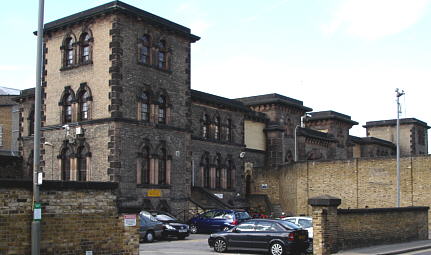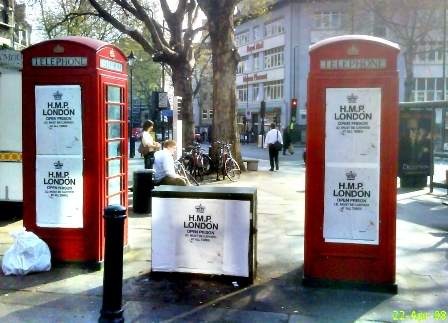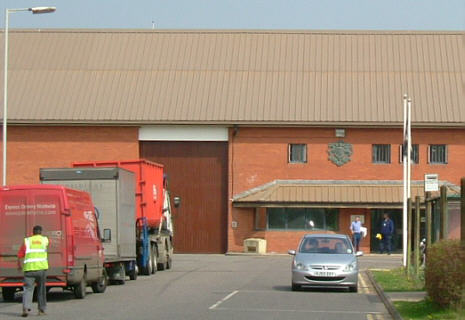|
General
Practice in Prison
  
|
My latest offering on this subject was given to the
Parliamentary
Enquiry of 2018
The
parts below refers mainly to my experience 2001-2009. In 2018
returned to HMP the Mount to to find it little changed, and the nicest
prison to work. My recent 2020 experience is in London Remand Prisons.
Around 2003 the NHS took over prison medical services. In
Hertfordshire, Dacorum PCT Herts PCT) took over the medical
services of HMP The Mount, Bovingdon in 2005. Before then prison's medical services were run by the Home Office,
in common with most other prisons. Prison Medical Officers reported
to the Governors alone. Medical officers were not usually GPs. Medical
care for a vulnerable population was outside the NHS. That has changed
for the better.
The
NHS take-over of commissioning for Prison Medical Services
Local
commissioning for prisons did not make much sense as prisoners are
shunted around prisons across commissioning boundaries. In 2013 this
was rationalised with the abolition of Primary Care Trusts. For
England, NHS England looks after prison helathcare
The NHS has the budgets for Prison Healthcare
whilst The Governor remains responsible for all that happens in his or
her prison.
Our Document
Archive is here
In
2007/8 Dr Bulger worked
and provided consultancy at HMP Wandsworth through Secure
Healthcare. This social enterprise had internal difficulties;
it
was bankrupt in June 2009 and Wandsworth PCT took back the contract. It is now run by Oxleas NHS Trust
Archway provided medical
services to HMP The Mount
2002-5. After a dispute with a Governor about the ethical treatment of
prisoners, the contract was temporarily awarded to Pathfinder PCTPMS
practice. Leave was granted for judicial review. Then Pathfinder and
HMP The Mount was put out to tender. In 2007 Archway Surgery
and Archway
Development and Consulting won back the HMP The Mount Contract APMS and took over The Pathfinder Practice.
They became part of Archway surgery, now run by NHSolutions
as I retired from Archway. HMP The Mount's medical services are now provided by West Herts NHS Community Trust.
|
Imprisonment as a
punishment extends only to deprivation of
liberty. Prisons
should not add to that punishment by also
depriving people
of other human rights, such as access to health care equivalent to that
available in the community, or exposure to greater risks to their
health than
they would face in the community"
From Prisons
Drugs and Society, Published in September 2002 by WHO (Regional Office
for Europe) Collaborating Centre for Health in Prisons, Prison Health
Policy Unit, Department of Health, England.
https://www.gov.uk/life-in-prison/healthcare-in-prison
|
Consultancy
in Prison Health Care
We
provided
services for the Healthcare Commission when it handled prisoner
complaints, providing reports. Since 2009 the work has been
with
coroners, (Death in Custody) and Medical Defence Society
reports as an expert witness and in London Prisons
Issues in prison Healthcare: (links)
HMP
The Mount and
Archway's Contract.
Archway's contract was to
provide
medical
services in the light of the new NHS approach.
Archway
Surgery's contact
at HMP The Mount finished on 31st March 2006.
In January 2008 we won the contract
against
Commercial and NHS competition to run these services
again as part of our successful bid for Pathfinder
practice.
Documentation and Prison
Healthcare
We were originally HMP The Mount for
three and a half years. Some of
the documents that we used are HERE
.
In June 2006 The Royal College of GPs Secure Environments Working Group
has set up a search engine which seems to have gone!
Archway's
Orginal Vision at HMP The Mount
The Prison population may have diseases in unusual proportions, but not
dissimilar to any inner-city general practice. We see more patients
with diseases associated with ethnic minorities. We see more with
hepatitis
C and B, a few patients carrying HIV, and of course many more people
with dependency personalities. There are a few patients with fully
developed psychiatric disorders. There are a handful of schizophrenics,
a few with endogenous depression, but nobody with mania at the time. Now
that personality disorder has come into the health remit (broken link),
there
are
issues as to how we should treat and manage these people, but we have
the same issues in the community as a whole. Dependency is linked to
the personality disorder problems. The prison population seems to age
faster than the rest of us, but otherwise the diseases and problems we
see are those of any inner-city general practice.
Prison
Medicine is General Practice: with added
security
issues.
Prison Medicine
should no longer be seen as a
speciality
in its own
right. G.P.s working in prisons may wish to develop special interests
in subjects useful to the prison population, such as dermatology, liver
diseases, GUM, mental health and drug dependency, but no longer is
reasonable to study prison
medicine as an isolated speciality.
When
we arrived we found a culture clash between
what we did as G.P.s and what the prison service healthcare staff
expected. Healthcare staff skills and attitudes were very
different by the
time we left in March 2006. Problems we encountered as listed
below:
1.
History
taking and examination as the norm. We
surprised
staff at the beginning, now some years ago, by taking such time, and
insisting on
doing so. We brought in our own examination couch and screen to
facilitate
this. Getting the patients story was fascinating in its own
right,
but of course gave the clues to underlying medical problems.
2.
Follow up.
Originally the Healthcare staff
are were recruited from casualty. Medicine seen as
all crisis management and emergency
care. The concepts of follow up, discharge
planning,
medicines management with medicine reviews seemed foreign. Chronic
disease management was very poor.
3. Access.
We found that staff assumed that access by prisoners to the doctors had
to be
actively discouraged. NHS Primary Care's 24 hour and 48 hour
access targets to NHS professionals, obligatory for G.P.s, was
considered to be a sign of
weakness. A complicated wait for the wait system
with applications being sent, in a controlled way, from the wings to
Healthcare was in
place. It often took three weeks or more, simply for a
prisoner
to make an appointment to find out his blood test result. There was no
other mechanism for him to get the result. Before we
attempted
to put an end
to it, many emergency presentations were sent away because the prisoner
had
not made the formal application. Changing these attitudes and
views took two years. In 2006 we set up an 0800 number for
prisoners to be able to ring in on their "PIN" phone system from the
wings to talk to healthcare staff, and make appointments in the normal
way of a G.P. practice. This had not been implemented when by
the
time we left, it seemed that progress was blocked. Wing staff
would no longer know who is contacting healthcare under the 0800
system. Medical confidentiality is difficult to maintain within a
prison setting.
4. Confused
primary and secondary care divide. Patients
would have
been sent directly to psychiatry, as an example This gave problems for
the G.P.s as we were then expected to do the prescribing on patients we
had not seen nor had referred.
Service we provided
We provided one of
two doctors
every morning, offering continuity of care.
The
G.P.s working at the Mount undertook NHS
appraisals that
include an appraisal of the work carried out by the doctors in the
prison.
Archway
Surgery was on call one in two nights
and
weekends (such contracts were outlawed in the hospital service). The
duty Governor could still demand that the doctor attends irrespective
of
clinical need. In later 2005 the local out of ours service (Harmoni)
took over out of hours provision.
When
we started, as in most prisons, there was no clinical
computer.
We put one in. G.P.s find it unsafe to work without a clinical computer.
Prisoners are not
registered with a G.P. practice,
and their NHS records remain with their own home G.P, if
they
had one;
a large proportion of prisoners are from overseas. Our
enquiry
about obtaining NHS numbers for these NHS patients (for use with
referrals and pathology reporting computer links) opened up a whole can
of worms, as yet to
be resolved. NHS Connecting for Health and NHS referrals to
hospitals and pathology links demand
NHS numbers.
Dispensing of
medicines was done in house, using hospital type
cards.
NHS prescriptions (FP10s) are not used. In our third year, we
finally had the PCT introduce a
pharmacist. Until then we had no pharmacist; medications
arrived
from another
prison. The
clinical system (Microtest’s) has a dispensing module,
modified to pint
out labels, so we could use
the hospital type cards instead of FP10s. The system was ready for
the pharmacist for local drug ordering.
We were bringing
in NHS systems and clinical
governance. For the first time the designated diseases
(such as
hepatitis C and food poisoning) were
notified to
the Health Authority in accordance to the law. We attempted
to
set
up protocols for TB contacts, human bites, needle sharing, and drug
dependency
issues. We sought an open and simple untoward event reporting, and a
complaints system for prisoners similar to that which applied to
general practice. G.P.s are the clinical lead of a
team
approach outside, but in the Mount we did not have a role that could
direct events. We were only there for a few hours each day.
There
was a "centrifugal" structure to all the care services, with nurses,
doctors, pharmacist, visiting consultants and psychiatric services all
looking in different directions for their clinical governance and
management structures.
There
were some oddities of prison practice.
The Segregation Unit
ward round had to take place every day before adjudications. This
ritual is a leftover from earlier times, when, well within living
memory, prison doctors had to taste the food and had to certify people
were fit for bread and water, birching or both. The “Seg
round” and
other form filling in general were assumed to be the main tasks of the
Prison Medical Officer at The Mount in 2002. The General
Practice
approach, prisoners as
patients, has required a culture shift. In 2005 the
"seg unit" changed its name to Care and Separation Unit. CSU.
The
change in name was real, and reflected what the "seg" actually
did. The care from officers at The Mount on the
CSU was
excellent.
The fear of a suicide in
custody drives
Home Office interest, creating
its own paperwork. The Prison Service had a touching faith that the
medical profession can divine the risk of suicide in all cases. We are
dealing with some angry impulsive young men with personality disorders.
They may self harm, but not often clinically depressed, and can be
dangerously
impulsive. A new wing based system has been introduced replacing the
"2052" forms,
called ACCT whose details were here
The Mount is not a remand prison. Remand (local) prisons carry greater
risk of
everything because of their huge turnover, with most prisoners straight
off the
streets. The
Mount is a
category C training prison with 720 inmates, seeing
double that in a year, but all have come from other prisons.
There are a few lifers but some stayed only a few weeks. Now prisoners
arrive with at least 18 months go to go of their sentence.
The pressure on the prison service is such that many who would seem to
be category B prisoners now seem to come to the Mount and the 18 month
restriction may have to be lifted.
The Prison
Service needs
to avoid sending prisoners to
hospital because of the security risks involved. The
escort and
security costs are huge. Staff shortages meant that outpatient
appointments were often cancelled. It is up to the medical team to
resist such pressure, while at the same time we had to help the Prison
Service.
We did this by reducing the need for many appointments by doing house
procedures such as emergency suturing, and by using email consultations
with
digital photography. We set up the NHS on-line outpatient booking
service, Choose and Book. There may not be any
choice for prisoners, but booking on-line would be helpful to
ensure an even flow of
patients to the hospital, taking pressure off the prison escort
services.
We
managed to fix a system to get Pathology
Links
(hospital computer to the clinical computer in Health, attaching to
patients record) after two year’s struggle. As all local G.P.
practices
are using links we had problems in getting timely pathology results
back, being the only local “practice” left using
paper, so results were
going astray.
The Prison
has other
health care contracts. There is X-rays on site
twice a week and they are read and reported twice a week. There is
chiropody and in–house dentist. An optician comes in but has
limited
equipment. There is a GUM doctor, and a psychiatrist and some CPN
services.
Illicit drugs
get
into all prisons over the fence. We simply treated
patients as if they are “on the out” and, like any
GP we realise our
patients can obtain illicit drugs if they want to. Thankfully most
patients have been detoxified from major addictions by the time they
get to The Mount.. Doses sold within prison tend to be smaller than on
the street. We
avoided
prescribing anything that has a market on the wings. We followed the
British National Formulary
to the letter, so “co-anything” are hardly used,
and diazepam does not
have any role. The difficulty was to detect the patient that must
have
morphine related drugs for their pain.
We
developed a positive approach
to dependency issues and restrain ourselves from adding to the problem.
Our policy was well known to the prisoners and this was making life
easier all round. As at 31st March we did not have a single
prisoner on benzodiapeines. We think that is a record for a
UK
prison. Benzos
and
diazepam in prison is here
We
were to move to treating drug dependency
according
to NHS guidelines.
We were
working on Quality
and Outcomes Framework (QOF) for the Prison.
We forget that G.P.s are used to computers on their desks for a decade
or more. Some hospital trained staff saw the computer as the enemy,
nothing to do with treating patients; the computer is for
administrators, not for nurses or doctors. Quite apart from getting the
data on, we will have to invent our own QOF data sets. Patient turnover
is high and age group relatively young. The number of patients with the
chronic diseases outlines in the standard GP (GMS) contracts is
relatively small, and the prisoners do not stay long enough to collect
the indicators. More relevant outcome measures should be applied for
this population. The standard new GMS reports from the computer would
not make sense: it will not be able to give figures of cholesterol
every 15 months as prisoners move on. Targets on Hepatitis B and C
status would be more useful, and types of prescribing monitoring.
The Future:
We had
hoped that Archway and prison services could be
integrated as a PCT Primary Care Service/PMS project, with staff moving
freely between the two parts. This would have ensured that modern
primary
care standards pertain to both the Prison and to Archway Practice. It
would have helped with recruitment and prevent professional
isolation. The PCT put all the medical services (that is
dentist, pharmacist, doctors and nurses) out to tender as an single APMS project.
A number of
applications were made, including ourselves working with Harmoni, the
local out of hours provider. It seems that the Primary Care
model
that was the basis the PCTs APMS bid was not longer
acceptable to the local prison service. In March 2006 the PCT decided
not to appoint any of the bidders and continues to provide as well as
commission the service. There was a major
rethink by the NHS commissioners (PCT) and Prison for the delivery of
healthcare services. The Governor remains
responsible for all that occurs in the prison, and so is in charge of
clinical governance, but the PCT has the budget.
A new bidding process is being undertaken in November 2006 for HMP The
Mount. The PCT intends to replace doctors with nurses and to
reduce doctor input to create an intensively nurse led service.
HMP
WANDSWORTH
It
is a remand category B prison. The first impressions are that the
category B and C of a prison does not really reflect the type of
prisoner. The Mount takes prisoners from other prisons,
preferably with a year or more of their sentence, including lifers,
with time enough such that they can undergo training. These prisoners
have unsorted medical and psychological problems. The CAT C
training prison is often the prisoner's last chance to get these issues
sorted before discharge.
Wandsworth
on the other hand is a local prison so it takes people straight from
the courts or remand or have just been sentenced. There is a
wider range of prisoner at a remand prisoner. The high
turnover, and the fact that patients are arriving off the streets
present risks for prisoners and their doctors. Many prisoners
at a Wandsworth will not be staying for long. Escorting
prisoners to hospital seems to be less of an issue for
Wandsworth. The hospital is nearby.
The
contract for largest prison in the UK was awarded to a new
Social enterprise called Secure HealthCare. This had its
heart in the right place, but after three years the contract was taken
away. There had been clinical governance problems, but a huge overspend
forced it into liqudation and the PCT took back the contract.
We gather this is the first NHS social enterprise to suffer
such a fate.
BBC Prison
Service reports are
here
Our
Archway's Prison document store is here
Detox
and Drug Dependency
Elderly
Disability
|



